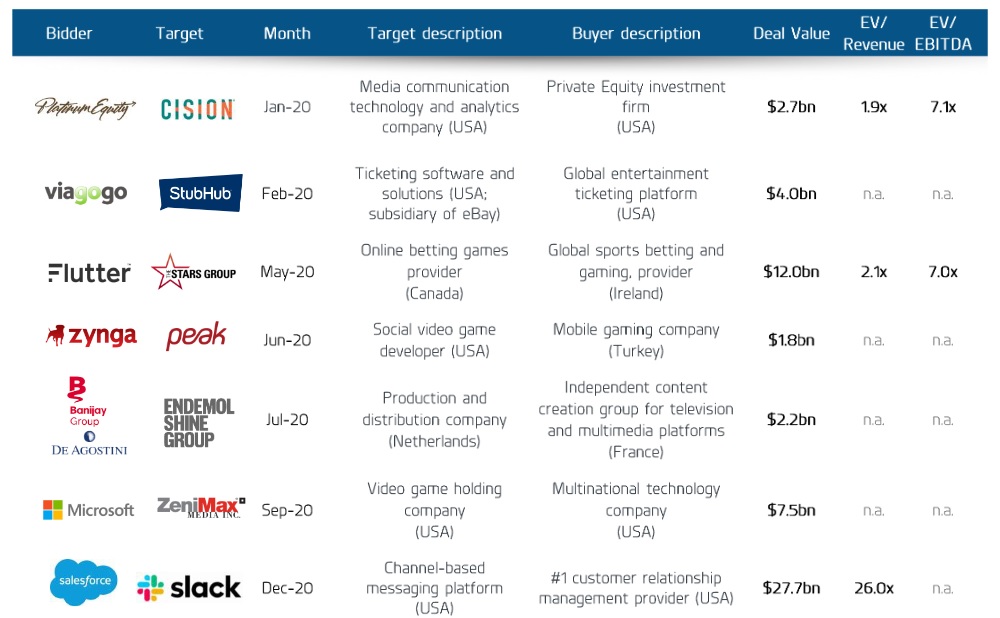M&A activity tumbled 19% in 2020, Ciesco, the international advisory firm revealed in a new annual report (pdf) today, with only 13 deals worth over $1 billion, against 28 announced in 2019. The firm tracks tech, digital, media, and marketing deals, and identified 1,091 in 2020. The US and UK were the most active markets, with 505 and 143 deals respectively. (France, 53, Germany, 51, and Canada, 43, trailed).
The firm expects more activity in 2021: "We see strong interest in data, tech, ecommerce and CRM-enabled capabilities," Ciesco noted, adding that it expects digital transformation to "accelerate at super speed in 2021". In terms of geography, deal focus is set to be on the USA, UK, Germany, and China", it anticipates. "Amsterdam is also among... priorities as a regional hub, especially considering Brexit."
Cognizant proved the most acquisitive tech firm in 2020, making seven deals globally, with Accenture making the most buyouts in the consultancy space, including in the UK, US, Germany and China, with CEO Chris Sahota noting "the attractiveness of data and technology-driven business models to financial investors, and through last year’s turbulence, businesses are learning to adapt and future-proof their operations."

There was some activity by GAFA (Google, Amazon, Facebook and Apple) as well, however at a smaller rate than other players and less than in previous years - a result of COVID-19 combined with ongoing regulatory hearings into allegedly anti-competitive market behaviour of these companies.
Commenting on the report, CEO Chris Sahota, CEO of Ciesco, said: “2021 will be a period of re-invention for many companies.
"Technology and data will be at the forefront of this evolution, with smart use of data informing decisions across all parts of an organisation. Global holding networks spent much of 2020 restructuring their operations in the face of declining revenues... We see a strong appetite for M&A to strengthen technology services, disciplines and geographies.”

Tech trade ticks upwards
New data from Tradeshift’s Index of Global Trade Health meanwhile points to a significant rise in purchasing activity between technology suppliers and their customers, with the number of new orders and invoices relating to technology purchases growing 16% in Q4, 2020.
Tradeshift’s analysis of digitised invoicing and ordering data shows a particularly strong end to the year in the US, where the number of transactions between buyers and suppliers jumped 29% in Q4, double the rate of growth seen globally during the period. Trade activity in the Eurozone rose 22% compared to the previous quarter.
Brexit troubles?
While business confidence appears to be improving, Tradeshift data shows that UK trade activity continued to struggle in Q4. Transaction volumes across the region grew just 7% on-quarter and remained well below the levels seen before the pandemic: "The combination of a significant drop in activity during Q2 and a weak recovery meant that UK trade activity finished the year 36% below the pre COVID level in March 2020", Tradeshift noted, in troubling data for UK policymakers.
Tradeshift CEO Christian Lanng told The Stack: "When the pandemic first hit, a lot of major IT infrastructure projects went on hold.
"CIOs were asked to switch gears and focus only on projects that would help keep the company operational during lockdown. Spending didn’t necessarily decrease, it just got reallocated.
"[But] a lot of businesses claimed to be fully digital before the pandemic. They found out pretty quickly that they weren’t. Most modern business software has evolved iteratively by adding new layers on top of existing ones. What you end up with is a layer of digital icing covering up 30 years of accumulated business crust and manual processes.
Lanng added: "When COVID hit, a lot of these systems simply broke down. Businesses were able to put a bandaid on those issues, which allowed them to continue functioning. But those problems didn’t go away. We’re starting to see IT decision-makers moving away from business continuity thinking and towards a strategic view of what they will need to do in order to build long-term resilience. We’re only just getting started.
"This wave of digitalisation is not really about technology.
"The solutions have been there for a long time, but its a lot harder to motivate people to change when things are ticking along. The moment a crisis hits, you are forced to challenge long-held beliefs, and the moment you challenge one set of beliefs, it opens the floodgates to a systemic reappraisal of everything. I’m seeing a real shift from 'this is how we do things' toward a 'let's give this a go and see if this works' mentality."









